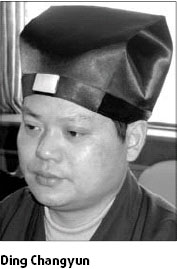Priest says Taoism should take the lead
Taoism is more ideally placed than other religions to contribute to the harmony of Chinese society, said CPPCC member Ding Changyun, a Taoist priest from Shanghai's Qinci Yangdian Taoist Temple.
"Among the five major religions in China, Taoism is the only indigenous one," he said.
"The close relationship between Taoism and traditional Chinese culture makes it easy for common people to accept Taoism's doctrine of harmony."
Founded during the Eastern Han Dynasty (AD25-220), Taoism advocates the pursuit of the ultimate harmony between nature and society and a long happy life. Many parts of Chinese culture, such as its cuisine, martial arts and traditional medicine, have ties to Taoism.
"The difference between Taoism and Buddhism is that one cultivates oneself for the next life in Buddhism. In Taoism, one lives for this life," said Ding.
The Zhengyi Sect of Taoism, to which Ding belongs, does not require its followers to totally forsake their secular lives. Ding himself has a family and a son.
Located in Shanghai's Pudong District, the Qinci Yangdian Taoist Temple maintains close ties with the local community. Every year the temple provides support to poverty-stricken middle-school students in the district, and members of the temple often visit local nursing homes for the elderly.
Ding said he had seen the positive effect Taoism could have on people's lives.
Once a young entrepreneur told Ding that he wanted to become a Taoist monk because his friend had cheated him, leaving the entrepreneur depressed. Ding told the man that becoming a monk was not the only way to practice religion, and that he should carry on with his enterprise, since he could contribute more to society as an entrepreneur. Persuaded by Ding, the man gave up the idea of becoming a monk and went back to work.
"Taoism does not try to convert more and more people for its own sake," said Ding. "Taoism has a rather loose relationship with its followers."
Ding said Taoists seek harmony at four levels: Harmony within oneself, harmony among people, harmony between people and society and harmony between people and nature.
"In a Taoist's eyes, every being is equal. Man is only a part of the universe and has no right to dominate it," he said. "Man's destructive activities have already caused many bad consequences. We have to learn to respect nature."
In the last three decades, Ding said he had seen changes in people who follow Taoism. In the 1980s they were mostly elderly people, but in the 1990s more middle-aged and young people began to follow Taoism. In the 21st century more people with higher educations had turned to the religion.
Throughout the history of Taoism, its doctrines and practices have primarily been passed on orally, and its different schools have maintained tight control of their different interpretations, resulting in the loss of some key texts. Ding said the establishment of Taoist colleges had helped the religion spread more broadly than in the past.
"Taoism is a religion that is very much attached to this society, and it will continue to serve the society," said Ding.
(China Daily 03/16/2007 page6)














